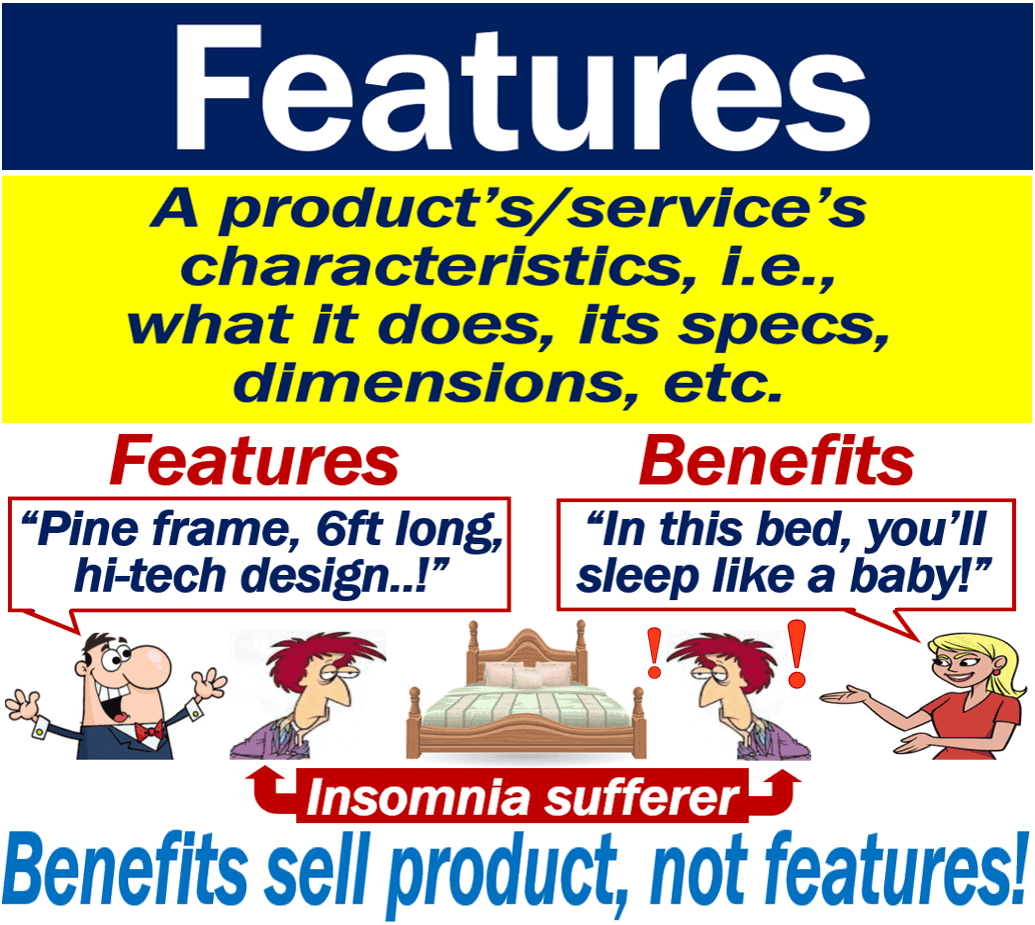Features are characteristics that set a product or service apart from other similar items. A product feature is an actual physical property or function.
It is something about the product that describes it. It may be inherent in the design. However, a feature is not the benefit of a product or service. Customers buy because of benefits, not features.
For example, a feature of a pair of sunglasses may be the biodegradable plastic that it is made of. What sets it apart from most other sunglasses is that it is environmentally friendly. Its environmental friendliness is a feature.
The benefits of sunglasses is being able to drive without glare, protecting your eyes from damage, and looking cool.
Of several meanings the Cambridge Dictionary has for the word “feature(s),” this one is related to marketing:
“Something that makes a product, machine, or system different, and usually better, than others of a similar type.”
Understanding the nuanced characteristics of a product’s features can greatly enhance the consumer’s appreciation and perceived value of the product.
In lay English, the word ‘feature’ means:
- A typical quality of something or a major part of it. For example: “London’s main features are its museums, theaters, musicals, and Royal Palaces.”
- A part of an area of land or of a building. For example: “The most impressive feature of the house was its massive kitchen.”
- Parts of a person’s face that we notice when we look at them. For example: “His best feature is his chin.”
Product feature vs. benefit
In an article on Entrepreneur.com, Laura Clampitt Douglas writes that most businesses do not really understand what the difference between features and benefits is. If you do not know the difference, your marketing plan is unlikely to work.
-
Product features
Product features are specifications or characteristics. Features are things that we can list in a description, plan, or design.
Below are some examples of features:
- That pharmacy is open 24 hours.
- Our smartphone has a 60-number speed dial.
- When you buy that toy, you do not need to go out and buy batteries because they are included.
A feature is a statement of fact about a good or service that a company is promoting.
However, features do not entice customers to part with their money.
-
Product benefits
When customers look at a product, they think “What’s in it for me?” The answer to that question is the product’s benefit.
Let’s look at the smartphone with a 60-number speed dial. A benefit for the customer is that they can contact people without effort. They are also less likely to make the frustrating mistake of dialing the wrong person.
If a pharmacy is open 24 hours, it means that I can get medications there whenever I want. So, if somebody at home has a splitting headache at 3 am, there is something I can do to help. Being able to deal with pain problems at any time is a benefit.
Recognizing that features must align with customer needs ensures that the product’s benefits are highlighted effectively in any marketing strategy.

Sell benefits, not features
The biggest mistake a company can make is to promote a product’s features rather than its benefits.
-
Mary has insomnia
Let’s imagine that Mary has insomnia. She has not been able to get a good night’s sleep for months. She walks into two shops; Beds Galore and Lotsa Beds.
-
First bed store talks about features
The salesperson in Beds Galore spends a long time explaining how modern the new springs are in a mattress. He goes through a bed’s list of features, including its dimensions, what the headboards are made of, etc.
-
Second bed store talks about benefits
Mary then goes into Lotsa Beds. The salesperson there tells her that this bed can help her get a good night’s sleep.
He talks about how fresh she will feel in the morning after eight hours of top quality sleep.
The salesperson in Lotsa Beds focused on the product’s benefits.
So, which shop is more likely to sell a bed to Mary? The answer is easy – Lotsa Beds. Why? Because it focused on the product’s benefits and not its features.
Remember, if you want your product to sell well in the marketplace, focus on benefits! In this context, the word ‘marketplace‘ means the same as ‘market‘ in its abstract sense.
“Features” – example sentences
Below, you can see seven sentences that illustrate how the term “features” is employed in the world of marketing. They may help you gain insight into how to use the term in various contexts:
- “Our latest smartphone model’s features include a state-of-the-art camera and an ultra-fast processor, appealing to tech-savvy consumers looking for cutting-edge technology.”
- “The new backpack’s water-resistant feature is a game-changer for outdoor enthusiasts who demand durability and performance from their gear.”
- “In our marketing materials, we emphasize the organic cotton feature of our bedding collection, resonating with environmentally conscious customers.”
- “The vehicle’s safety features, such as autonomous braking and lane-keeping assistance, are a central part of our marketing campaign to families.”
- “Highlighting the smartwatch’s health-tracking features has significantly increased its appeal to fitness-conscious individuals.”
- “Our home security system’s features, including its 24/7 monitoring and instant alerts, provide peace of mind, which is a strong selling point in our advertisements.”
- “By focusing on the laptop’s feature of extended battery life, we cater to the needs of busy professionals who require reliability throughout their workday.”
Two Videos
These two YouTube videos come from our sister channel, Marketing Business Network. They explain what the terms “Features” and “Marketing” mean using easy-to-understand language and examples:
-
What are “Features” in Marketing?
-
What is Marketing?
